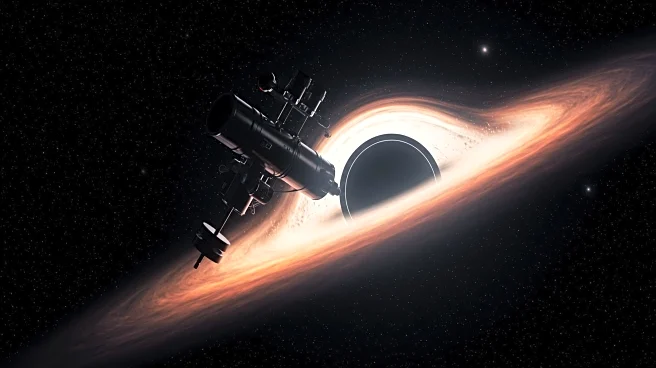What is the story about?
What's Happening?
Researchers using the James Webb Space Telescope (JWST) have observed a surprising pattern in the rotations of ancient galaxies, leading to a bold hypothesis that our universe might be within a massive black hole. The study focused on 263 ancient galaxies, some dating back to 300 million years post-Big Bang, revealing that approximately 60% of these galaxies rotate clockwise. This finding challenges previous beliefs that galactic rotations were largely random and suggests a potential hidden cosmic order. The hypothesis posits that the shared rotational direction could be influenced by a black hole's gravitational pull, prompting a reevaluation of existing cosmological models and the universe's fundamental laws.
Why It's Important?
The implications of this discovery are profound, potentially altering our understanding of the universe's structure and origins. If validated, the hypothesis that the universe is within a black hole could necessitate a fundamental reevaluation of cosmic principles and the creation of new models to describe the universe's behavior. This perspective challenges established theories and invites a reassessment of space-time and matter within this unique cosmic context. The scientific community is eager to explore these possibilities further, as they could lead to groundbreaking insights into the universe's deepest mysteries and its potential origins.
What's Next?
The scientific community is expected to continue investigating the black hole hypothesis and alternative explanations, such as observational biases like the Doppler effect, which might influence interpretations of galactic rotations. Addressing these biases is crucial to ensure the integrity of future research and validate current findings. As technological advancements enhance tools like the JWST, the potential for revolutionary insights into the universe's mysteries grows, driving scientists to expand the boundaries of knowledge and question the fabric of reality.
Beyond the Headlines
This discovery underscores the importance of precise astronomical observations and the challenges faced in making accurate measurements. The pursuit of understanding cosmic dynamics and the factors influencing galactic evolution is crucial for redefining our grasp of the universe. The notion of the universe being within a black hole raises profound questions about the behavior of matter and the flow of time, opening new avenues for exploration and understanding.















